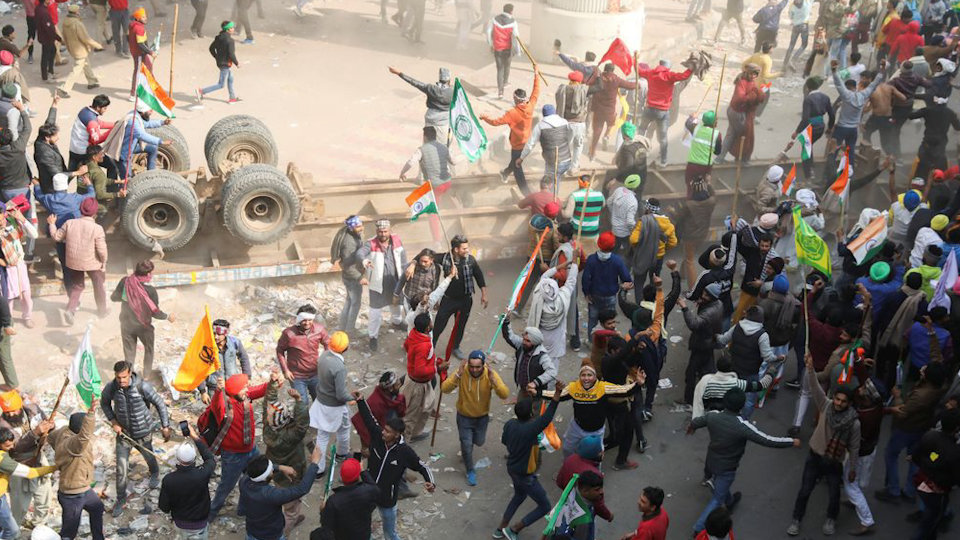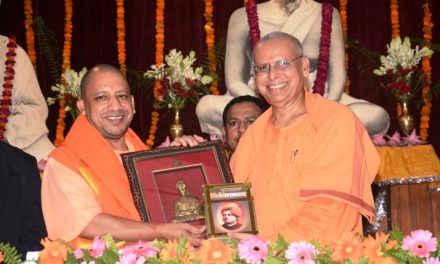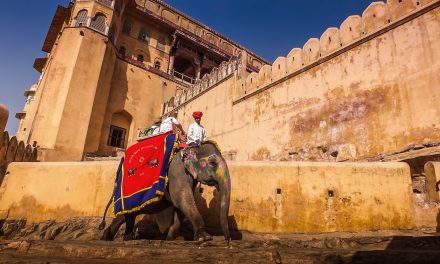Mahatma Gandhi famously stopped the Non-Cooperation movement in 1922 following an incident of violence at a police station in Chauri Chaura in Uttar Pradesh. He felt that the movement had lost its moral compass and could not be carried forward in the form he had envisioned it as. Ironically, various self-proclaimed Gandhians in the current Farmers’ protest have shown little remorse for platforming anti-social elements, some of whom infamously unfurled their flags on the flag-pole on which the Indian tricolour is unfurled by the Prime Minister of India on Independence Day and caused wanton destruction of property across the national capital, besides injuring 300 policemen. A protester also died when his tractor overturned. Yes, they did not supplant a Tricolour while doing so and happened to carry the Indian flag on their tractors and in their hands, but the person climbing the pole openly and brazenly threw away a national flag.
The flags that were put up were not those of the Bharatiya Kisan Union or that of any of the many organizations that have joined the protest but the Nishan Saheb, which is a flag with a special religious connotation for Sikhs. While the flag being unfurled in a place where the Indian national flag is unfurled usually may be improper, what is more problematic is the open alignment and association of some of the protesters with the Khalistani cause.
Punjabi actor-singer-activist Deep Sidhu, who the farmer unions have alleged was responsible for leading the protesters to the Red Fort, has been quoting Jarnail Singh Bhindranwale while there have been posters of Bhindranwale seen in the protests, something which Pro-Khalistani outfit Sikhs for Justice (SFJ) had urged farmers to display a couple of days before the conflagration. Regarding it as an opportunity to fight for all Indian farmers, members of Khalistani separatist groups, such as Sikh DMV Youth and Sangat, were seen joining the protests outside the Indian embassy in Washington DC on 26 January.
Khalistani Sympathizers in the Farmers’ Protest
We must look more closely at members and organizations in the protest who have had problematic associations, particularly around the Khalistani cause and with respect to Jarnail Singh Bhindranwale, to see for ourselves how deep this rot possibly is.

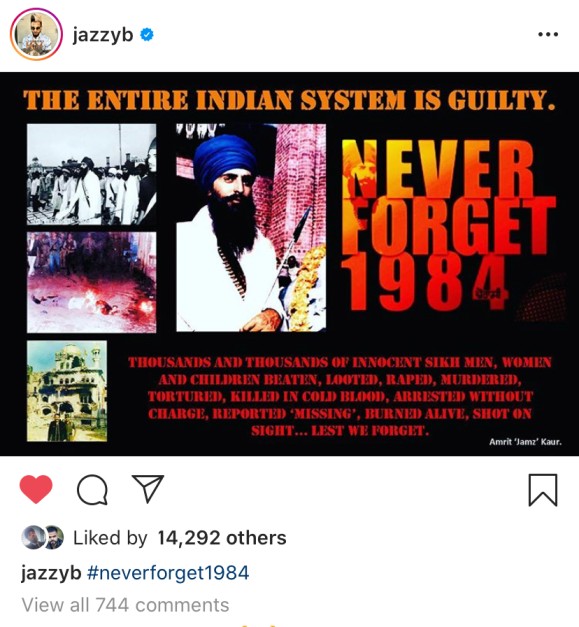
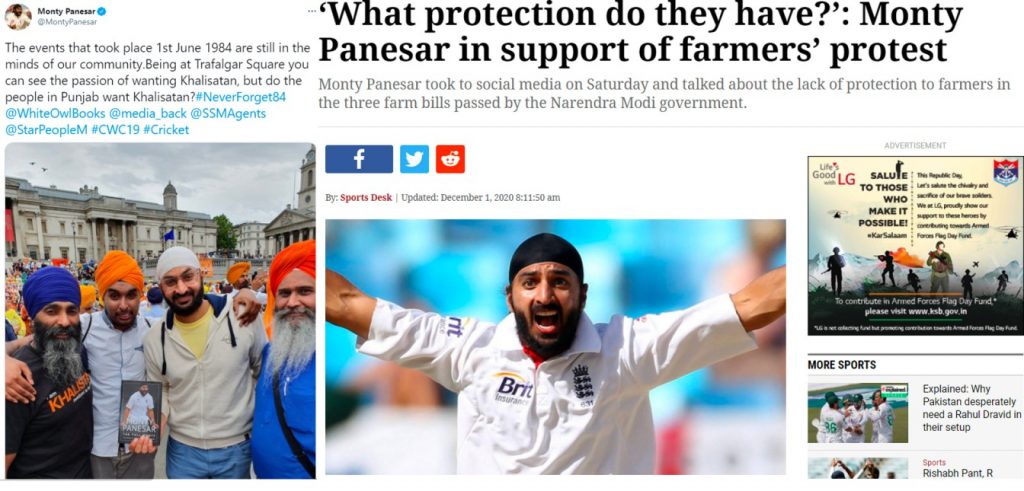




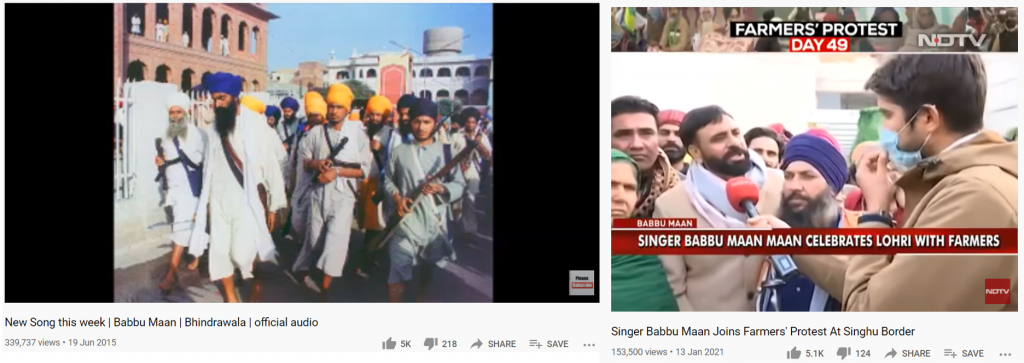
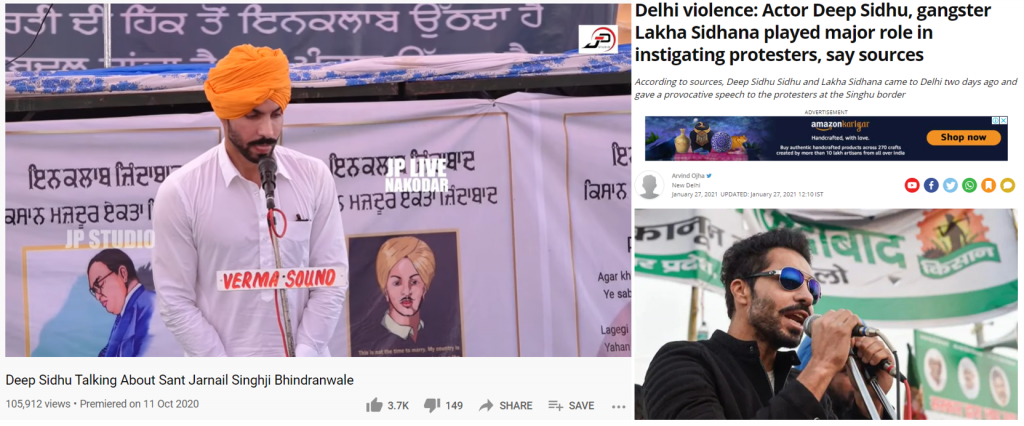
More Direct Associations and Calls to Rally
While prominent individuals who are not only supporting but in certain cases leading the farmers protest having sympathies with Bhindranwale or Khalistan may be problematic in itself, the systematic participation of groups that are openly pro-Khalistan raises further eyebrows. If in the former case (of individuals), correlation may not be causation, in the latter case (of organizations) the proactive role of organizations who are primarily single-issue organizations (of seeking Khalistan) in the farmer’s protest is extremely troubling!
While there has been a case of ‘terrorist activities’ against Kisan Mukti Sangram Samiti president Akhil Gogoi (FIR No. 1688/2019, National Investigative Agency) and a case of Unlawful Activities (Prevention) Act 1967 against Surjit Singh Phul – leader of the Bharti Kissan Union (Krantikari), along with Bhartiya Kisan Union (Dakaunda) being founded by Dr. Darshan Pal who along with Maoists such as Vara Vara Rao, Kalyan Rao, Medha Patkar, Nandita Haksar, SAR Geelani, and BD Sarma founded the People’s Democratic Front of India, the dangerous and direct correlation with Khalistani activities of a participating organization is seen in the case of Khalsa Aid, allegedly a front organization of Babbar Khalsa International (BKI), as mentioned in the case RC-05/2012/NIA/DLI of the National Investigative Agency and purported to have financed UK-based BKI operatives such as Balbir Singh Bains and Joga Singh. Khalsa Aid has been actively participating in and mobilizing people for the Farmers’ Protest.
Openly pro-Khalistani US-based secessionist organization Sikhs for Justice (SFJ) announced $1 mn grant to farmers for Khalistan support and said that it would grant Rs. 5,000 as assistant to repay their agriculture loans to all those farmers who register ’25 votes for the Khalistan Referendum 2020′. Previously SFJ had announced a reward of $250,000 for unfurling the Khalistani flag at India gate. Sources in the Delhi police are said to have highlighted a ‘huge conspiracy’ that has been hatched between Pakistan’s Inter-Services Intelligence and ‘rogue elements linked to Khalistani outfits’ to disrupt the tractor rally.
The Dilution of an Agitation by Problematic Platforming
Those who keep speaking of not convoluting the two issues of Farmers’ Protests and the Khalistani cause can hopefully see the direct correlation and connection that some radical groups are actively trying to establish. This is highly unfortunate since the genuine concerns of the farmers of India are now getting drowned in a sea of cacophony and misappropriation of the stage by radical elements who seem to have a hidden agenda.
If Indian Sikhs seek to voice their concerns regarding representation and self-determination within India, that is a separate and equally legitimate issue, and even there the secessionist and violent tendencies of the Khalistani movement are not welcome. I see my Indian Sikh brothers and sisters as an integral part of the Indian state, without whom India as it is would not be India. We have had a Sikh President, a Sikh Prime Minister, a Sikh Chief Justice of India and two Chief of the Army Staff in the past. I would like to encourage those sections of the Indian Sikh community who still have outlying issues on representation, self-determination or other miscellaneous grievances that need to be resolved to engage with the Indian state – their state, to resolve those problems.
With regards to the current crisis around the Farm Acts, it is time for the Indian government and the honourable Supreme Court of India to take cognizance of the situation and resolve the two-pronged crisis: one of sorting out any concerns and issues of the farmers of India regarding the Farm Acts 2020 and secondly of the proxy war that some organizations seem to be waging through the platform and cause of the Farmers Protest. The farmer who feeds the nation or whose son is in the army cannot be anti-national. By desecrating the national capital on 26 January 2021, the protesters let down all farmers.
Dissent, not destruction, is part and parcel of democracy, even as liberalism in a mobocracy is like a fish out of water.
We must engage with the farmers and work with them to find a common ground, without being misguided by petty politics and hidden agendas.
In Conclusion
Any agitation or perturbation that comes to the fore, to question shortcomings of an existent socio-political system or policy must be along the lines of prudent agitation that steers clear of convoluting other issues into its aim, particularly problematic associations and alignments, and thereby diluting their own cause and moral ground. The plight of farmers over the years have been overlooked by successive governments and their situation must be improved. Farmers have been underpaid, faced the brunt of middlemen in the mercantile chain and even (very unfortunately) committed suicide in various parts of India. In such a setting, the government must build bridges and remove any mistrust, along with looking at comprehensive reforms on the MSP front and balanced liberalization. However, the mode of seeking these all-too-important change is not by counterproductive violence and anarchism.
After all, winds of change and reform can only make a difference when they are more than whiffs of air in disarray and chaos!
I unequivocally stand for the interests of farmers in India but not for the misguided radicals masquerading as representatives of, and who are effectively sabotaging their, cause.

